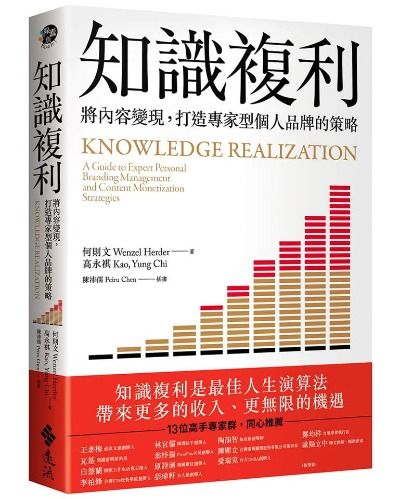Reading Lesson #4 - "Knowledge Compounding: Strategies for Monetizing Content and Building an Expert Personal Brand" | Let your past self help your future self from now on!
Title: "Knowledge Compounding: Strategies for Monetizing Content and Building an Expert Personal Brand"
Author: He Zewen, Gao Yongqi Publication date: 2022/05/26

About the Author
He Zewen is a <br class="smart">well-known career coach and writer, founder of Taiwan's largest career community "Career Lab", and the founder and secretary-general of TYCIA Taiwan Youth Career Innovation Association. He is good at assisting organizations and individuals in the brand management of their external images. He is the first to pay attention to the issue of personal branding, and also assists many organizations in employer brand packaging and public promotion. He has set up training courses for professional writers many times, helping more than 10 students get the opportunity to sign a publishing contract.
Gao Yongqi <br class="smart"> is good at practical and live workshop course design, knowledge article SEO management, automated sales funnel design, knowledge realization mechanism management, etc. He has assisted nearly 100 experts in various fields such as business consultants, marketing experts, knowledge transfer, negotiation and communication, physical and spiritual healing, media writing, talent consulting, and career exploration, and established more than 500 knowledge products.
What is knowledge compounding?
The book compares the brain to a lemon tree, and the process of encountering difficulties and challenges every day is like a lemon tree that absorbs nutrients and begins to give birth to lemon fruits. Then we need a series of "transformation of lemon fruit into a marketable product" process, and this process is called knowledge productization.
We can divide knowledge compound interest into two stages. The first stage is " quality-based knowledge compound interest ". The focus is to improve our ability and quality, so that we can become experts in a certain field. The key is to improve our knowledge learning process. depth, breadth and speed. The second stage is " value-based knowledge compound interest ", which focuses on "building and applying one's own knowledge product portfolio" to practice "making remuneration worthy of talent" and "making expertise visible to the world".

So that each learning is no longer separate, but can be linked and superimposed
We need to change the inertia of "re-learning and rearranging every time" in the past, and start to make good use of the previous learning every time, use them as the cornerstone, and superimpose our knowledge of this field. Only then can we deepen the understanding of domain knowledge, broaden the connection of related knowledge, and speed up the learning of new knowledge.
Realize knowledge by operating a personal brand
Continuous output, become an expert in a field
Many people may not have confidence in themselves and are afraid of being criticized for their poor writing, so they dare not create. But in fact, as long as you are better than others at this skill, even if only a little bit better, you have a way to teach others.
There are many examples in the book. For example, Waki , the webmaster of Reading Outpost, when he first started to read, found that he often forgot the content after reading the book, or he couldn’t remember when he actually encountered a problem and wanted to apply it, and he didn’t know how to review it. and apply the key points learned from the book. Vaki began to write reading notes. At first, he only wrote on Medium. Later, thinking that he had the ability to write programs, he simply set up a website to collect reading experience. With continuous output, he now has more than 90,000 fans on Facebook, and has accumulated more than 100 episodes of the Podcast program "What to Read Next".
Or He Zewen , one of the authors of this book, who was completely ignored in his early writing. Seven or eight years ago, what he wrote on Facebook, every three or four thousand words, was about the international political and economic situation that he was interested in. And his stratosphere is not interested in these, the number of likes is only a few single digits, and his further contributions to major media columns are also silent cards. But he did not let go of his interest in this field because of "no traffic", and continued to write with interest. Later, I shared what I saw and heard in Vietnam, and used my personal experience to analyze the difference between the strategic layout of Taiwanese businessmen and Korean businessmen in Vietnam. It suddenly became a popular article, which was reprinted by many media and shared by many people in the industry, accumulating hundreds of thousands of views. That gave him the opportunity to publish his first book.
The examples of these two people tell us not to be shy, to know how to market yourself, to shape your own personal image through constant writing and sharing, and let yourself be seen by everyone.
So let go of writing and creating!
Remember that no matter what your professional level is, there are always people in the world who are similar to you and need your help. As long as you are willing to share, you can create value and share information with others.
The Four Keys to Personal Branding
- At the beginning of your career, try to build your good name by running a personal brand in the workplace, doing every report and every project of the company. Be honest with people and you'll gain a good reputation.
- A good reputation is actually more based on professional ability, so at the beginning of a career, how to cultivate corresponding professional ability is the most important issue.
- When running an online personal brand, try to become an expert KOL , instead of pursuing the knowledge and traffic of many people, and there will not be much applause and attention in the early stage of becoming an expert.
- Don't build your own value on the recognition of others, but how much positive influence and change you can bring to the organization or audience.
knowledge compound interest note-taking
We need to rely on our second brain- notes , which allows us to visualize and record our thoughts, so as to overcome our forgetting nature, and to facilitate inspection and rearrangement to improve the quality of knowledge connection. However, the note-taking method we generally use may actually cause our " knowledge loss ".
There are three indicators of knowledge loss notes : repeated records and lack of links, not being able to find them when they are used, and incomprehensible after finding them. We want to create compound interest in the quality of knowledge. In addition to fighting the nature of repeated learning and forgetting, we must also improve the quality of the connection between knowledge. More important than quantity is the quality of " connection ".
At this time, the so-called " thematic notes " are mentioned in the book, referring to the Zettelkasten card box note-taking method invented by the German sociologist Niklas Luhmann. The main concept is to put the content of the notes after each "date note" Divide into small cards based on each topic and number them so that related knowledge can be linked together.
Three steps of note taking
- Organize the "information record" into a "date-style knowledge note".
- Split "date notes" into multiple "topic notes".
- Integrate future "new related knowledge" into "existing knowledge topic notes".
Be sure to use digital notes that can be searched by keywords , because only in this way, when you want to use or organize existing knowledge in the future, you can find the already written topic notes more conveniently and quickly, and you don’t have to worry about losing them , cannot be found. Through some convenient two-way link (Double Link) note-taking software, these related topics can be linked to each other, which can help you to extend your understanding during research and strengthen the effect of future learning and thinking.
The world is very big, as long as your passion and professionalism can bring value to others and convert them into benefits, then no matter which path you choose, you will have the opportunity to create your own success.

after reading
Thanks to He Zewen, the author of this book, for the invitation in the post , which allowed me to see the book before it was published. This is a book that teaches you how to accumulate knowledge in the modern age. By continuously accumulating knowledge to achieve the effect of compound interest, convert what you have learned into value, build your personal brand and master future trends. After reading the book, I decided to start sharing my readings on FB as the first step in building a personal brand. In addition to the content I mentioned in the book, there are many pages about the future development of slashes, the note-taking method of knowledge compound interest, the strategy of content creation, and more detailed knowledge productization content. This book will be published tomorrow. Recommended To all those who want to pursue knowledge and intend to realize it through creation!
This article was published simultaneously on Vocus and Medium .
Welcome to follow me, support me with clap, and share your thoughts in the comments section!
Like my work? Don't forget to support and clap, let me know that you are with me on the road of creation. Keep this enthusiasm together!

- Author
- More